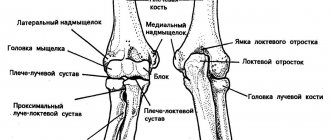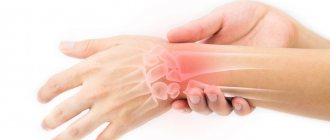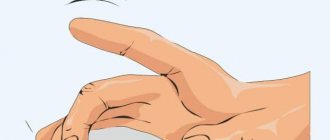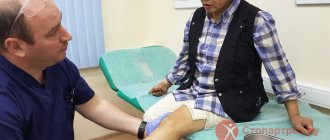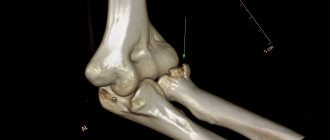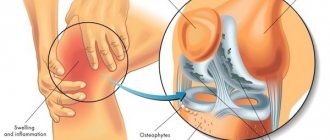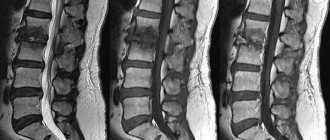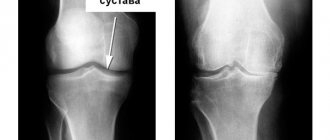When to visit a doctor
When your hand becomes numb due to an uncomfortable position and this happens infrequently, then there is no need to worry. An uncomfortable position during sleep leads to pressure on blood vessels and nerves, resulting in a numb hand. As a rule, in such cases there is no need to go to the clinic, however, you should start to worry if this happens every night; a stiff arm interferes with sleep and causes painful discomfort.
Advertising:
Clinical manifestations will help the doctor make a correct diagnosis; several conditions can be identified:
- hands go numb at any time of the day;
- right hand goes numb;
- left hand goes numb;
- both hands become numb;
- numbness lasts a long time and brings significant discomfort;
- hands suddenly become numb, with additional deterioration of vision and mental disorders.
You should pay close attention to your condition and consult a doctor, because only he can find out why your hands become numb in your sleep; the reasons can be completely different:
Today, ischemic stroke is not uncommon, since many factors influence the development of the disease. But what is it, how does it manifest itself, and what complications can arise. Read more in the article: “consequences of ischemic stroke, how long they live.”
| Characteristic manifestations | Causes of discomfort |
| Both hands go numb at once or alternately | It can be assumed that there are disturbances in the central nervous system. Most often, the cause of this condition will be osteochondrosis or intervertebral hernia. |
| Only the right hand goes numb | Most likely, the cause will be carpal tunnel syndrome, arthrosis, cervical osteochondrosis. This condition may also be a precursor to a stroke. |
| Only my left hand is numb | The reason most likely lies in cardiac diseases. Numbness of the hand during the daytime may signal the imminent onset of a heart attack or micro-stroke, so you should immediately visit a specialist |
Why does my hand go numb?
Physiological reasons
Short-term numbness immediately after waking up is provoked by compression of blood vessels and nerves due to the awkward position of the hand. Accompanied by tingling, “goosebumps”, “disobedience” of the limb. It occurs in people who put their arm under their body or under a pillow, or throw a limb behind their head. Disappears a few minutes after changing body position.
Neuropathies
Numbness of the hand is determined by neuritis of infectious etiology, neuropathies due to compression of the nerve trunks by bone growths, tumors, inflammatory infiltrates:
- Radial nerve.
Hypoesthesia is detected along the back of the shoulder and the dorsum of the forearm. - Ulnar nerve.
There is a loss of sensitivity on the ulnar side of the palm. - Median nerve.
The radial half of the palm suffers.
Polyneuropathy
Characterized by symmetrical damage to the arms. Initially, the process involves mainly the distal parts of the limb, then numbness, paresthesia, and other symptoms spread in the proximal direction. Polyneuropathies occur with alcoholism, severe somatic diseases, oncological processes, some infections, vibration disease, exogenous intoxications. Sometimes they develop during pregnancy.
Plexit
Damage to the upper bundle of the brachial nerve plexus is manifested by numbness of the outer side of the forearm and shoulder, the lower bundle - hypoesthesia of the inner side of the shoulder, forearm, and hand. Combined with weakness of the muscles of the same localization. With total involvement of the brachial plexus, a decrease or loss of sensitivity is detected on both the outer and inner sides of the arm. The causes of brachial plexitis are:
- Birth injuries
with the formation of obstetric paralysis. - Traumatic injuries
: shoulder dislocation, clavicle fracture, damage to the ligamentous apparatus of the shoulder joint. - Compression of the brachial plexus
: aneurysm, hematoma, cervical rib, neoplasm. - Infectious diseases
: herpes, cytomegaly, brucellosis, tuberculosis, syphilis. - Dysmetabolic disorders
: diabetes mellitus, gout, dysproteinemia, metabolic diseases. - Iatrogenic damage
during operations and manipulations.
Numb hand
Scalenus syndrome
Scalenus syndrome occurs as a result of compression of the branches of the brachial plexus, subclavian arteries and veins by the scalene muscles. A characteristic feature of the pathology is the sudden onset of symptoms. Pain in the neck, arm, and head is accompanied by muscle weakness, paresthesia, pale skin of the arm, weakening or absence of pulse. The area of numbness is determined by the involvement of certain branches of the plexus.
The most common cause of scalene syndrome is cervical osteochondrosis. Muscle compression also develops with curvature of the spine, after injuries, against the background of congenital anomalies, weightlifting, and significant weight gain.
Radicular syndrome
Numbness of the hand develops due to compression, traumatic injury, or inflammation of the spinal roots at the level of the lower cervical and upper thoracic vertebrae. The causes are osteochondrosis, intervertebral hernia, spondylosis. The symptom can be detected with injuries of the spinal column, spondylolisthesis, vertebral osteomyelitis, spinal meningitis. Sometimes radicular syndrome is formed against the background of neuromas of the roots, tumors of the spinal cord. The topic depends on the affected root:
- C5 – numbness on the outside of the shoulder;
- C6 – sensitivity of the outer surface of the forearm is impaired;
- C7 – the back surface of the shoulder and forearm suffers;
- C8 – hypoesthesia is detected along the inner surface of the forearm;
- T1-T2 – numbness of the hand is possible.
Myelopathy
Dystrophic changes in the spinal cord are accompanied by sensory disturbances below the level of damage. The extent of changes depends on the extent of the lesion. Hypoesthesia or loss of sensitivity in the hands is caused by myelopathies of the following origin:
- Spondylogenic and discogenic:
osteochondrosis, spondylosis, spondyloarthrosis, involutive spondylolisthesis, disc protrusion, intervertebral hernia - Ischemic:
transient cerebrospinal circulatory disorders, spinal stroke. - Post-traumatic
: concussion, spinal cord contusion, fractures with spinal cord damage, other spinal cord injuries. - Carcinomatous
: paraneoplastic processes in lymphogranulomatosis, leukemia, lung cancer, and other oncological processes. - Infectious
: neuroAIDS, neurosyphilis, Lyme disease. - Other
: toxic, radiation (against the background of radiation therapy), metabolic (for endocrine diseases, metabolic disorders).
Other nervous diseases
Numbness and tingling are the most common auras associated with migraines. They start at the fingertips and spread to the entire arm and half of the neck. Then the disturbances disappear and are replaced by headaches. Numbness, tingling, burning with senestopathies are distinguished by a significant variety of localization, combination with other, often fanciful complaints. Migrating sensations, periodic or constant, can spread to various areas of the body, including the hands.
Vascular damage
Takayasu's disease is manifested by numbness, weakness, and pain in the arms, resulting from inflammatory damage to the aorta and large arteries. Depending on the location of the inflammation, one or both limbs may be affected. An external examination reveals weakening or absence of pulsation and paleness of the hands. Fainting, dizziness, visual disturbances, and heart problems are possible.
Unlike other obliterating vascular diseases, thromboangiitis obliterans can affect the vessels of not only the lower but also the upper extremities. Pain, numbness in the hands and forearms, pallor, cyanotic distal parts of the extremities, absence of pulse, formation of painful nodules on the fingers, and trophic disorders are noted.
Other reasons
A list of other diseases that may be accompanied by numbness in the hands includes:
- ODS diseases
: bursitis of the shoulder joint, glenohumeral periarthrosis. - Cardiovascular pathologies
: ischemic heart disease, myocardial infarction. - Mental disorders
: panic disorder, hysteria.
Incorrectly selected pillow and uncomfortable sleeping position
In order for the body to fully recover and gain strength during sleep, it is important that the pillow is comfortable, and preferably orthopedic. An incorrect, high pillow forces the spine to unnaturally arch in the neck area, causing your arms to go numb during sleep.
There is a disruption in the blood supply and nutrition of the nerve endings of the cervical spine. In the compressed area, blood circulation weakens, and the limbs, especially the hands, begin to go numb.
It is very important to choose not only a suitable pillow, but also choose a comfortable sleeping position and clothing that does not restrict movement.
All this can lead to numbness in your hands. Despite the fact that this problem is not serious and can be solved very quickly, it still causes inconvenience to a person.
Advertising:
Hands thrown back behind the pillow very often cause numbness. At night, when the body is sleeping, the heart works a little slower than usual, so blood may not flow to the hands in sufficient quantities, especially if a person occupies an unnatural position during sleep.
Dizziness with cervical osteochondrosis is a fairly common phenomenon that causes a lot of inconvenience to the sick person. This occurs due to compression of the vertebral artery by the bony processes. Read more in the article: “dizziness with cervical osteochondrosis.”
Causes of left arm numbness at night
The reasons for the appearance of the symptom of loss of sensitivity must first be sought in possible physical pathology:
- Uncomfortable position during night sleep. Drip occurs if you sleep on your left side with your arm under your head.
- Uncomfortable clothes. Sometimes elastic bands and tight cuffs on the sleeves of pajamas and nightgowns will cause pinching of blood vessels and the limb will go numb.
- The pillow is too high.
Serious disorders accompanied by symptoms of numbness in the hands, requiring specialist intervention:
- Cardiac pathology. Accompanied by loss of sensation in the limb for more than 1 hour in the presence of pain in the heart area.
- Due to a lack of vitamins, metabolic disorders occur. As a result of vitamin deficiency, the membranes of nerve fibers are damaged, which leads to loss of sensitivity of nerve endings and numbness syndrome. Fingers go numb.
- Thrombosis. Severe pain and swelling of the limb occur, accompanied by paresthesia.
- Narrowing of the arteries that supply the heart and arm with blood is an indicator of atherosclerosis.
- Osteochondrosis of the thoracic and cervical spine is often associated with loss of sensitivity of the patient’s entire limb from the forearm to the fingertips.
- With angina, any part of the arm can be affected by paresthesia. The patient has difficulty breathing and experiences pain in the chest.
- Myocardial infarction. In addition to loss of sensitivity, there is heaviness in the chest.
- Stroke. Numbness is a common sign of impaired blood supply to the human brain. When the left arm is paralyzed, hemorrhage occurs in the right half of the brain. There is a headache. The patient cannot adequately respond to what is happening. The patient's speech is impaired.
Vascular diseases as a cause of hand numbness
One of the most dangerous causes of numbness in the hands is ischemic stroke. Normal blood circulation in the brain is disrupted, usually in one area, this leads to numbness in the hands, as well as increased blood pressure and dizziness. As a rule, not only the hand, but also the face can become numb; depending on which side the loss of sensitivity occurs, we can assume which hemisphere is affected.
Advertising:
Prevention methods
To maintain the health of your back and joints, nerves and blood vessels, it is important to follow some rules of prevention. Doctors at the Clinical Brain Institute recommend:
- maintain a healthy diet - consume a sufficient amount of vitamins and microelements, and also avoid excess animal fats, salt and spices, and carbonated drinks;
- get rid of bad habits - smoking and alcohol abuse have a detrimental effect on the condition of the heart and blood vessels;
- regularly perform simple exercises for the health of the back and spine - they will increase the elasticity of the ligaments and strengthen the muscles;
- Spending enough time in the fresh air is a prerequisite for adequate oxygen supply to the brain cells;
- at the first symptoms, including headaches, numbness of the limbs, deterioration in health, it is important to immediately contact a specialist to receive competent medical care.
The Clinical Brain Institute is a multidisciplinary center that specializes in the treatment of headaches of various origins. Here you can undergo a full examination and receive a comprehensive treatment regimen for pain in the head and numbness in the hands. The doctors of our center are competent specialists of a wide and narrow profile. Treatment is prescribed individually, depending on the diagnostic results, and can take place either on an outpatient basis or in a comfortable hospital.
Clinical Brain Institute Rating: 5/5 — 1 votes
Share article on social networks
Spinal problems
Various diseases can manifest as numbness in the hands. Periodic numbness of the limbs, dizziness, and headaches should cause a person to contact a neurologist or osteopath. The cause of leakage can be both osteochondrosis and intervertebral hernia. Osteochondrosis is the collective name for a large complex of diseases of the spine, when a disturbance occurs in the metabolic processes of cartilage and bone tissue.
The progression of the disease leads to the destruction of the vertebrae, the spinal nerves begin to be compressed, and numbness and discomfort occur.
People who lead a passive lifestyle and work constantly at the computer are at risk. This could be office workers or schoolchildren. Few people pay attention to their posture and regularly get up to warm up; as a result, with prolonged exercise of the same type, a spasm occurs in the cervical region, and as a result, numbness of the hands both at night and during the day.
What to do if your left hand goes numb
In case of physical impact on a stiff arm, a light massage, changing the pillow or body position while resting is enough to get rid of the discomfort.
It is possible to use traditional methods of treatment (massage, rubbing, compress). 10-30 minutes is enough to improve the condition.
If paresthesia of the limbs occurs more than once and does not go away for a long time, you need to see a doctor for treatment.
Treatment of diseases, one of the symptoms of which is numbness of the hands, is prescribed by specialized doctors (neurologist, surgeon, hematologist, endocrinologist).
To make an accurate diagnosis, a number of examinations are performed:
- Blood analysis;
- Magnetic resonance imaging;
- Electrocardiography;
- Ultrasound examination.
If the hand becomes numb and a heart attack, infarction, stroke or vascular thrombosis is suspected, there is a need to urgently call an ambulance to carry out resuscitation measures and transport the patient to the hospital. Delay may cost the patient his life.
Carpal tunnel syndrome
Frequent overstrain of the tendons of the hand can cause numbness in the hands, so the condition is called carpal tunnel syndrome. People who work at a computer and do a lot of typing, musicians, and seamstresses most often suffer from it.
– people who perform the same type of actions with their hands every day face discomfort during pregnancy.
Advertising:
On the arm you can find a channel through which the tendons pass. Normally they are protected, but when overstrain occurs, the nerve is compressed and the hand goes numb.
Manifestations of this syndrome can be felt just at night.
The condition requires treatment; if this is not done in time, then complete death of the muscle tissue of the thumb is possible. Women are more susceptible to the disease, and, in the absence of proper treatment, over time the finger will lose its sensitivity and the person will not be able to clench a fist.
Other causes of hand numbness
Hands numbness at night may indicate a whole list of diseases:
Advertising:
- diabetes;
- ischemic disease;
- chronic high blood pressure;
- anemia;
- genetic diseases of the nervous system;
- alcohol abuse;
- B vitamin deficiency;
- arthritis.
Why your hands go numb at night during sleep can only be said with certainty after an examination.
How to deal with numb hands at home
The situation cannot be ignored if a person is haunted by a feeling of discomfort every night. You can cope with the problem at home, but after mandatory consultation with a specialist in order to exclude diseases dangerous to humans.
If no means help restore restful sleep, neither changing the pillow, nor daytime contrast procedures, then you need to look deeper for the cause.
Folk remedies will help alleviate your condition. Contrast baths are quite
, when hands are alternately lowered first into hot and then into cold water.
After completing the procedure, an ointment containing turpentine is rubbed onto the hands and special gloves are put on to retain heat.
Advertising:
Hands may become numb due to weakened blood vessels; hot water, which should be drunk in small sips on an empty stomach, will help to cope with this problem.
Prevention of hand numbness
An examination of the body did not reveal any serious diseases, then eliminating numbness will not be a difficult task. You can start with morning exercises, which will affect all limbs and all muscle groups. Morning physical activity will help put your heart into a working rhythm and get your blood circulating.
- Physiotherapy will not be superfluous. The procedure will increase blood circulation. Electrophoresis gives good results.
- Therapeutic exercises that will strengthen muscles, tendons and joints.
- Manual therapy. Massaging the numb area will enhance blood supply to weakened areas.
Not everyone perceives numbness in the hands at night as a signal that it’s time to get examined. Many tolerate this condition, believing that these are manifestations of the norm. Indeed, very often numbness in the hands occurs due to improper sleep and incorrectly selected bedding and, as a rule, this problem is quickly and easily solved. However, if the numbness is systematic and a person experiences it every night, and it does not go away for a long time or both hands are affected, then it is unlikely that it will be possible to do without consulting a doctor.


